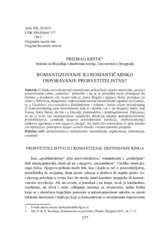Romantizovanje ili romantičarsko osporavanje prosvetiteljstva?
Romanticizing or romantic denial of enlightenment?
Апстракт
U članku se tvrdi da rani romantizam, artikulišući vlastito stanovište, upućuje prosvećenosti jednu „estetičku“ primedbu i da se ta primedba može protegnuti do duboko u dvadeseti vek. Autor rada je, posle Šlegela i njegove škole, pronalazi ne samo u Veberovoj dijagnostici institucionalizovane racionalnosti zapadne civilizacije, te u Dijalektici prosvetiteljstva Horkhajmera i Adorna i kritici ciljno orijentisanog ili instrumentalnog uma savremenosti koja je usledila, već i, na drugačiji način, kod
Fukoa, braće Beme, pa čak i u fi lozofi ji postmoderne i neopragmatizma. Zaključuje se da je svim tim orijentacijama zajednička detekcija manjka samoprosvećenosti prosvetiteljstva, izostanak njegove autoreferentne korekcije, neobračunavanje troškova ogrešenja o ono njegovo „drugo“, što onda bilo nepovratno ili ipak nekako još ispravljivo, potkopava njegov izvorni kritički i emancipatorski program.
The article argues that early Romanticism, articulating its own view, addresses to the Enlightenment an “aesthetic” remark which be traced deep into the twentieth century. The author of the work found it, after Schlegel and his school, not only in Weber ‘s diagnosis of institutionalized rationality of Western civilization, and in the Horkheimer’s and Adorno’s Dialectic of Enlightenment and the critique of the goal-oriented or instrumental reason of modernity that followed, but in a different way, also in Foucault, Böhme brothers, and even in postmodern philosophy and neopragmatism. It is concluded that all these orientations share detection of the lack od self-enlightenment of the Enlightenment and, consequently, the lack of its self-referential correction. These unaccounted costs of violations the Enlightenment
committed to its “other”, irreversibly or somehow still recoverable, undermines its original critical and emancipatory program.
Кључне речи:
prosvetiteljstvo / enlightenment / romantizam / racionalnost / organizacija / dominacija / umetnost / romanticism / rationality / organization / domination / artИзвор:
Arhe, 2015, 12, 23, 177-199Колекције
Институција/група
IFDTTY - JOUR AU - Krstić, Predrag PY - 2015 UR - http://rifdt.instifdt.bg.ac.rs/123456789/1518 AB - U članku se tvrdi da rani romantizam, artikulišući vlastito stanovište, upućuje prosvećenosti jednu „estetičku“ primedbu i da se ta primedba može protegnuti do duboko u dvadeseti vek. Autor rada je, posle Šlegela i njegove škole, pronalazi ne samo u Veberovoj dijagnostici institucionalizovane racionalnosti zapadne civilizacije, te u Dijalektici prosvetiteljstva Horkhajmera i Adorna i kritici ciljno orijentisanog ili instrumentalnog uma savremenosti koja je usledila, već i, na drugačiji način, kod Fukoa, braće Beme, pa čak i u fi lozofi ji postmoderne i neopragmatizma. Zaključuje se da je svim tim orijentacijama zajednička detekcija manjka samoprosvećenosti prosvetiteljstva, izostanak njegove autoreferentne korekcije, neobračunavanje troškova ogrešenja o ono njegovo „drugo“, što onda bilo nepovratno ili ipak nekako još ispravljivo, potkopava njegov izvorni kritički i emancipatorski program. AB - The article argues that early Romanticism, articulating its own view, addresses to the Enlightenment an “aesthetic” remark which be traced deep into the twentieth century. The author of the work found it, after Schlegel and his school, not only in Weber ‘s diagnosis of institutionalized rationality of Western civilization, and in the Horkheimer’s and Adorno’s Dialectic of Enlightenment and the critique of the goal-oriented or instrumental reason of modernity that followed, but in a different way, also in Foucault, Böhme brothers, and even in postmodern philosophy and neopragmatism. It is concluded that all these orientations share detection of the lack od self-enlightenment of the Enlightenment and, consequently, the lack of its self-referential correction. These unaccounted costs of violations the Enlightenment committed to its “other”, irreversibly or somehow still recoverable, undermines its original critical and emancipatory program. T2 - Arhe T1 - Romantizovanje ili romantičarsko osporavanje prosvetiteljstva? T1 - Romanticizing or romantic denial of enlightenment? IS - 23 VL - 12 SP - 177 EP - 199 UR - https://hdl.handle.net/21.15107/rcub_rifdt_1518 ER -
@article{
author = "Krstić, Predrag",
year = "2015",
abstract = "U članku se tvrdi da rani romantizam, artikulišući vlastito stanovište, upućuje prosvećenosti jednu „estetičku“ primedbu i da se ta primedba može protegnuti do duboko u dvadeseti vek. Autor rada je, posle Šlegela i njegove škole, pronalazi ne samo u Veberovoj dijagnostici institucionalizovane racionalnosti zapadne civilizacije, te u Dijalektici prosvetiteljstva Horkhajmera i Adorna i kritici ciljno orijentisanog ili instrumentalnog uma savremenosti koja je usledila, već i, na drugačiji način, kod
Fukoa, braće Beme, pa čak i u fi lozofi ji postmoderne i neopragmatizma. Zaključuje se da je svim tim orijentacijama zajednička detekcija manjka samoprosvećenosti prosvetiteljstva, izostanak njegove autoreferentne korekcije, neobračunavanje troškova ogrešenja o ono njegovo „drugo“, što onda bilo nepovratno ili ipak nekako još ispravljivo, potkopava njegov izvorni kritički i emancipatorski program., The article argues that early Romanticism, articulating its own view, addresses to the Enlightenment an “aesthetic” remark which be traced deep into the twentieth century. The author of the work found it, after Schlegel and his school, not only in Weber ‘s diagnosis of institutionalized rationality of Western civilization, and in the Horkheimer’s and Adorno’s Dialectic of Enlightenment and the critique of the goal-oriented or instrumental reason of modernity that followed, but in a different way, also in Foucault, Böhme brothers, and even in postmodern philosophy and neopragmatism. It is concluded that all these orientations share detection of the lack od self-enlightenment of the Enlightenment and, consequently, the lack of its self-referential correction. These unaccounted costs of violations the Enlightenment
committed to its “other”, irreversibly or somehow still recoverable, undermines its original critical and emancipatory program.",
journal = "Arhe",
title = "Romantizovanje ili romantičarsko osporavanje prosvetiteljstva?, Romanticizing or romantic denial of enlightenment?",
number = "23",
volume = "12",
pages = "177-199",
url = "https://hdl.handle.net/21.15107/rcub_rifdt_1518"
}
Krstić, P.. (2015). Romantizovanje ili romantičarsko osporavanje prosvetiteljstva?. in Arhe, 12(23), 177-199. https://hdl.handle.net/21.15107/rcub_rifdt_1518
Krstić P. Romantizovanje ili romantičarsko osporavanje prosvetiteljstva?. in Arhe. 2015;12(23):177-199. https://hdl.handle.net/21.15107/rcub_rifdt_1518 .
Krstić, Predrag, "Romantizovanje ili romantičarsko osporavanje prosvetiteljstva?" in Arhe, 12, no. 23 (2015):177-199, https://hdl.handle.net/21.15107/rcub_rifdt_1518 .



